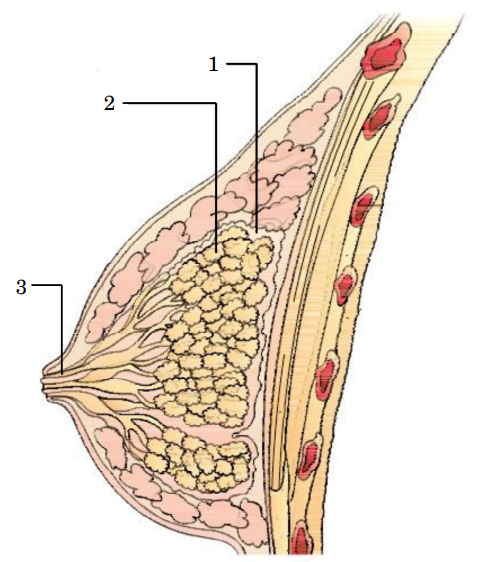Question
(a)
i) When and how does foetal ejection reflex begin ?
ii) Pituitary gland and uterine muscles play an important role during parturition. Explain.
iii) A functional mammary gland is a characteristic of all female mammals. Given below is a diagrammatic sectional view of a mammary gland. Identify the parts 1, 2 and 3, and mention one function of each of them.
or
(b)
i) How are the characteristic features of pollen, anther and stigma of a maize plant suited for pollination by wind ?
ii) How do you justify that :
1. Pollen grains are recovered from fossils ?
2. Micropyle remains as a small pore in the seed coat of a fully developed seed ?
Answer :
(a)
i)
• When foetus is fully mature/ after completion of gestation periods / after completion of pregnancy
• Mild uterine contractions originate in response to the signal from a fully developed foetus and placenta.
ii) Foetal ejection reflex triggers a release of oxytocin from the maternal pituitary, oxytocin acts on uterine muscles and causes contractions and expulsion of baby out of the uterus.
iii)
1 - Mammary lobes, has clusters of cells called alveoli.
2 - Mammary alveolus, secrete milk.
3 - Lactiferous duct, through this milk is sucked out.
or
(b)
i)
• Pollen- light / non-sticky, to travel easily through air
//
Produce in enormous amount, to compensate the wastage during pollination
• Anther –well exposed, pollen easily dispersed into wind current.
• Stigma –Large / often feathery, to easily trap air-borne pollen grains.
ii)
1. Pollen grains have hard outer layer exine made up of sporopollenin, which is one of the most resistant organic material known / no enzyme can degrade sporopollenin.
2. It allows the entry of water, oxygen into the seed at the time of germination.

